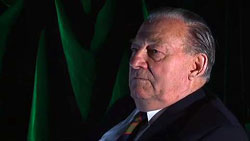 |
| Private Sid Whyte |
So from there they put us in an old disused church and we had nothing for two or three days until we went to a farmyard-like place and they killed a cow and made some soup and then we started to march towards Luxemburg, we went through [?Dulongs] and they put us in a rope factory. The French were inside, we were outside, and a fire started and that was a bit of scramble there. From there [?Cambrai], we were put in a civilian prison there. No, first of all we went into a barracks and we were all out on the square and then that night they moved us into this prison and some of the inmates were still there, and some of the darkies, they were on these rough wooden frames as beds with wire that did not stretch across, you know a chain link or something. Anyway they put us right up the top in this prison and there was quite a bit of firing going on indefinitely. So we came out of there and carried on the march, we came to the borders of Luxemburg you see. They piled us into German mandies or lorries, you know, they were open trucks with a trailer and open truck and they packed us in there and as we drove through Luxemburg the people dropped stuff, bread, cigars and things into the top of the open trunk and we went through into Germany and into a sort of reception camp there and I think we had, oh, a sixth of a loaf something like that. A very small part. I ate some of mine and what we kept was the respirator case and a gas, you know we had a gas case, and that was very handy and light to carry. They kept us dry you know. I put my bread in the respirator and used it as a pillow and went to sleep. Of course when I woke up the piece of bread I had there was gone. So from there they took us to the station and they packed us into cattle trucks. Sixty or more into a truck. You could only just stand upright and we were transported three days and four nights to Poland. We finished up at Torun and that was Stalag 20a. That was a series of forts and when we got there there were some worse off than us when they got out of the trucks because they were used to the coal and they were just like miners when they got out you know with the coal dust and then I went to fort 13 and was there for about a month or so and they formed a party of 250 that went to Gdynia. The Germans called it Gotenhafen then. Gdynia was the Polish port. The only port they had you know at the end of the corridor. So 250 went up there and they were sort of doing Council jobs and I was employed making bunk beds because it was a new camp and we were tearing some old buildings down for the timber and making bunk beds and that sort of thing. As I say the rest were working in the town and that sort of thing. Digging trenches and pipework and that sort of thing you know. One occasion I went down there with a Sergeant Willings. He was from B Company. We sort of worked together on a Burgermaster's house you know. We were boxing in pipes and that sort of thing and the rest of the fellows, a lot of the time, were building a promenade along the beach because it was a place called Adelsdorf, that was were the camp was and they where making a promenade along the beach to Gdynia, Gotenhafen. Of course they had to go in the sea to get these big boulders out. They put in a lot of posts you see with faggots behind them, filled it up with a lot of boulders. This was under the hill like you see and they did not last very long with it. Well there was no tide but when the tide blew the sea in it bashed it about a bit you know. Then we had these rails and tipper trucks which were used to transport the material and I remember there was a lot of jelly fish in the sea when we were out there. We used to go in naked with a rope and tie it around the bolder and haul it out. So then it came, that was 1940, I was there the Christmas. Then 1941 the main Stalag was calling in all the tradesmen. Being that I had been working on all the bunk beds and that I was one of those called in for that, carpentry, a joiner and we all went back to Stalag, there was 20b then and we were going to make up a party to go and prepare the bomb work in Berlin. We went there and we were deloused and our heads shaved right off, you know, that was for the second time, I had it with sheep shears, and we was going to Berlin but in the end that was quashed and they sent French POWs instead so we were sent back to where we were you see.